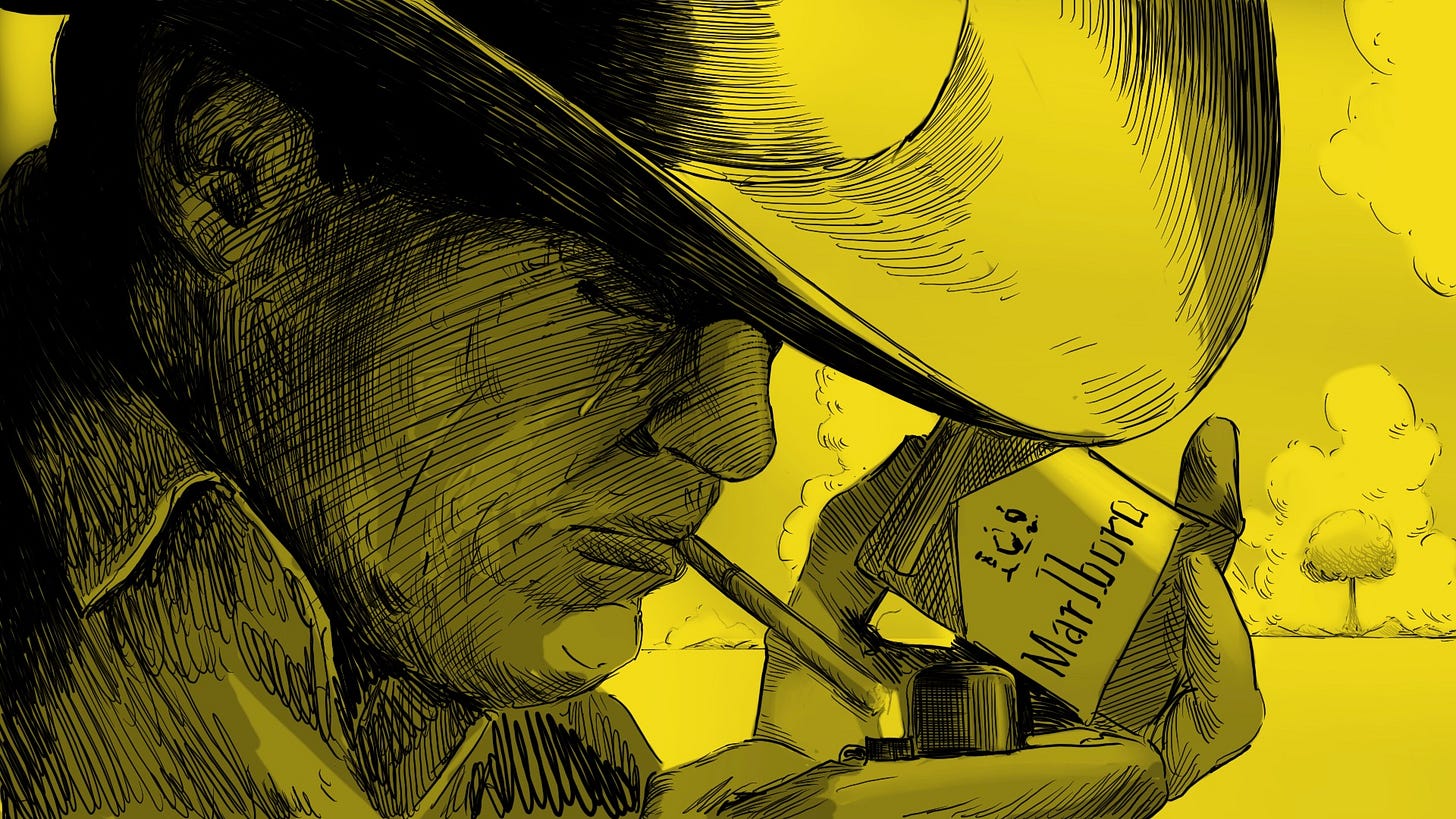TRUE WEST
The unwasted chroniclers of a wasted America
“My heroes have always been cowboys.” So goes the lyric from Willie Nelson’s cautionary song, depicting the tragedy of a man, who pines: “Pickin' up hookers instead of my pen, I let the words of my youth fade away.”
That’s definitely not what Cormac McCarthy did. He sobered up in 1976 noting, “If there’s an occupational hazard to writing, it’s drinking.” He did not drunkenly “squander several ensuing years in the company of thieves, derelicts, miscreants, pariahs, poltroons, spalpeens, curmudgeons, clotpolls, murderers, gamblers, bawds, whores, trulls, brigands, topers, tosspots, sots and archsots, lobcocks, smellsmocks, runagates, rakes, and other assorted and felonious debauchees,” as his protagonist Cornelius Suttree did.
His work and life make very clear that those intersecting myths of the whiskey-drinking high plains hero and the whiskey-drinking novelist who writes about them have always been bunk.
Blood Meridian. All The Pretty Horses. The Crossing. Cities of the Plain. No Country for Old Men. His oeuvre is a march of heroes and antiheroes, crossing back and forth over a phantom-like Mexican border. And while the ink and the alcoholic life gave out for other American greats, Hemingway (suicide), Capote (liver disease), and Denis Johnson (liver cancer) each right around the age of 60, in stark contrast, just last year, McCarthy published The Passenger at the age of 88. The novel was widely acclaimed, even landing on The New York Times’ 10 best of 2022 list. Unlike what we see in Washington D.C. on a daily basis, a rare feat of actual geriatric excellence.
McCarthy was distinctly not, as Nelson sings of the cowboy in his song, “Sadly, in search of, and one step in back of themselves and their slow-movin' dreams.”
But it seems the America he chronicled was.
In obituary after obituary, we see allusions to “a vanished America,” that existed in McCarthy’s work. For many, his death marks the end of more than just him. It’s the death of the last great American novelist, in the platonic sense. It’s yet another episode in the “slow-movin’” funeral for America (in ideal, in spirit) at which we’re all attendees.
America exists only in the telling, sure. But objectively, it is, has always been, and likely will always be a violent, hostile place. McCarthy knew that. Toni Morrison, too. The bottomless darkness under the apple pie façade has always been there. Overbearing morality meets a shocking absence of it. That’s us. We all know what really happened out there on the plains. And it’s still happening. We now know what really befell the heroic Marlboro Man. McCarthy’s work reads as a kind of American biblical epilogue. A newer testament where good and evil, God and devil, battled on the plains.
But he’s not the last great American stylist. There’s another chronicler of the West writing sermon-like verses that comes to mind: Kendrick Lamar.
They’ve both won Pulitzers (McCarthy for The Road, Lamar for DAMN.). They both use a supercharged vernacular dexterity to chronicle a rough American west, to unravel distinctly American stories of violence and terror, beauty and belief. (Just listen to Lamar’s unpacking of intergenerational trauma in “Mother I Sober.” A little different from shit like, “Percocets, molly, Percocets,” no?) Both McCarthy and Lamar share a palpable religiosity in their work. Both of their work is full of father-son dynamics, redemption arcs, the survival struggle, and the psychospiritual war between good and “the evils of Lucy” all around us.
And they both turned away from the drink. Lamar famously said, in reference to alcohol and drugs, “this is one thing I will never do.” I really don’t think it’s a coincidence. A level of awareness that acute demands total clarity. “I was never high, I was never drunk, never out of my mind,” Lamar raps, “You ain't felt grief 'til you felt it sober.” In the true West that McCarthy and Lamar occupy, drunkenness and creativity do not mix. “I’m my own individual man, that’s it. Not smoking and not drinking doesn’t put down my manhood and my coolness, you know. I’ve been cool since elementary.” That’s real radical individualism care of Lamar.
Open a McCarthy book to a page, any page, and pick a paragraph, pick a line, and you’ll find it packed to its fullest. In an era of rap where artists have never done less with so little, Lamar is an exception, his tracks fit to burst with words, words, words. The two are both savants at extracting so much from so little and so much from so much.
With McCarthy’s passing, we lost the last great American novelist of the 20th Century. It’s fitting, as the novel—the great art form of the 20th Century—has lost its vitality, its cultural importance, its audience, too.
Today, the preeminent writer in America is a sober rapper from Compton. His verses depict an America full of horror, hostility, and hope. An America pining for a closer connection to God. In the national myth, it’s on the frontier where we’d hoped we’d find Him. And we might still. The frontier is far from gone. It has perhaps moved to LA County where the battle between good and evil is on display at large, a rough place, a beautiful place, 130 miles from the border and somehow right on it, where we need all the heroes we can get.
Text by Andrew Smart / Illustration by Conor Donahue


